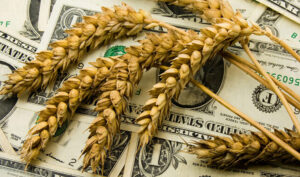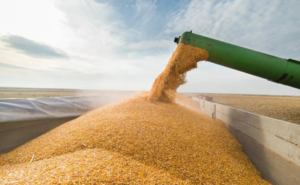
According to the results of 2025, Ukraine exported agricultural products worth $22.53 billion, which is 8.8%, or $2.15 billion, less than the previous year, according to the Ukrainian Agribusiness Club (UAC).
The association noted that despite the decrease in foreign exchange earnings, the share of the agro-industrial complex in the overall structure of goods exports in 2025 was 56.1%.
“Although this percentage has declined slightly compared to the record year of 2023, when agricultural products accounted for 61% of total exports, the industry continues to generate more than half of the country’s foreign trade revenues,” analysts emphasized.
The most noticeable trend was a reduction in agricultural exports to the European Union. While in 2022-2024 the EU’s share in the structure of Ukrainian agricultural exports consistently exceeded 50%, in 2025 it fell to 47.5% ($10.7 billion), according to statistics.
Some of the factors influencing this are changes in logistics routes and tighter regulatory restrictions on the European market. There has also been a general decline in trade dynamics, namely: the balance with the EU fell to $6.06 billion compared to $8.87 billion in 2024, analysts noted.
They emphasized that against the backdrop of declining export revenues, there is a reverse trend in the import segment. In 2025, purchases of foreign agricultural products rose to a record $8.75 billion over the past five years.
“Although the share of agricultural products in Ukraine’s total imports has remained stable over the past four years at around 10.8%, in absolute terms, spending on food imports is growing every year. At the same time, in 2025, more than 53% of all agricultural imports ($4.64 billion) came from European Union countries, which underscores the deep integration of Ukraine’s consumer market with the European market,” the UACB concluded.

Agricultural production in Ukraine fell by 6.6% in January-November 2025 compared to the same period last year, according to the State Statistics Service.
Thus, according to the results of 11 months of this year, the agricultural production index was 93.4% compared to January-November last year. In particular, the indicator for crop production reached 92.7%, and for livestock production – 96.2%.
Agricultural enterprises suffered slightly greater losses, with production at 93.2% of last year’s level. At the same time, the indicator for crop production reached 92.0%, and for livestock production – 100%. At the same time, the indicator for private farms was 93.7%. For crop production, it was 99.8%, and for livestock production, 90.4%.
The largest decline in production was recorded in the Donetsk region, where this index was 57.4% of last year’s level. There was also a significant decline in the Kherson (70.1%) and Dnipropetrovsk (79.3%) regions.
At the same time, two regions showed positive dynamics: in the Chernihiv region, the agricultural production index rose to 102.2%, and in the Vinnytsia region, to 101.6%.

IMK Agricultural Holding supplies about 20% of agricultural products to the European Union market during 2022-2024 and 2025 and therefore depends on the European market and insights that it applies in practice, despite constant shelling and losses due to the war, said its CEO Oleksandr Verzhikhovsky.
“If we talk about the export of our products and take a look at 2022-2023-2024 and the current 2025, then about 20% of our exports went to the European market. These were mainly wheat and corn. We export 600,000 tons annually, and about 20% of that traditionally goes to the European market,” he said at a conference during the Agritechnika-2025 exhibition in Hanover, Germany.
Verzhikhovsky added that at the same time, there is a clear downward trend in the share of products supplied to the European market.
At the same time, he acknowledged that IMC depends on imports from the EU for all components of its agribusiness: fertilizers, plant protection products, and equipment.
“In fact, we are preparing to join the European community — in fact, for us, there is no alternative. We are preparing within the framework of the Smart Green Strategy, approved for 10 years until 2033. It is aimed at preparing for the high environmental standards dictated by the European market,” said the CEO of the agricultural holding.
The agroholding’s Smart Green Strategy aims to make agribusiness more environmentally friendly, which is an additional bonus to increasing efficiency. As an example, he cited the abandonment of plowing in the Poltava region due to the need to preserve moisture in the soil and reduce the carbon footprint.
Verzhikhovsky added that it is difficult to talk about further prospects at the moment due to the military actions in the regions where IMC operates.
According to him, it is extremely difficult to work due to constant power outages caused by Russian shelling of the Ukrainian power grid. IMC was forced to suspend grain drying due to a fire in the dryer after the shelling. In addition, a few weeks ago, as a result of a drone attack, the agricultural holding lost 200 cubic meters of diesel fuel at its enterprise in the Chernihiv region.
“Of course, we are moving forward with the Smart Green Strategy to implement the ‘green agenda’, but in between problems and the need to solve more urgent and routine issues imposed on us by the situation in which Ukraine lives and works,” summarized the SEO of IMC.
As reported, Alex Lissitsa, advisor to the directors of the agricultural holding, said that IMC will not launch new investment projects in 2026, but will allocate about $25 million to upgrade its equipment.
IMK Agroholding is an integrated group of companies operating in the Sumy, Poltava, and Chernihiv regions (northern and central Ukraine) in the segments of crop production, elevators, and warehouses. The land bank is 116,000 hectares, storage capacity is 554,000 tons, and the 2024 harvest is 864,000 tons.
IMK ended 2024 with a net profit of $54.54 million, compared to a net loss of $21.03 million in 2023. Revenue grew by 52% to $211.29 million, gross profit quadrupled to $109.10 million, and normalized EBITDA increased 25-fold to $86.11 million.

Agricultural production in Ukraine in January-September 2025 decreased by 14% compared to January-September 2024, while in January-August the decline was 8.4%, according to the State Statistics Service (SSS).
According to its data, during the reporting period, livestock production decreased by 4.4%, and crop production by 16.4% compared to the same period in 2024.
At the same time, in crop production, the main decline was in enterprises – 20.9%, while in private households, the decline was 6.1%.
At the same time, the situation in livestock production was the opposite: enterprises reduced production by only 1.4%, while private households reduced it by 8.9%.
A significant decline in production was recorded in the Donetsk, Kherson, and Dnipropetrovsk regions, where production fell by 43.9%, 33.1%, and 24.4%, respectively. In the case of the Donetsk region, there was an 18.5-fold drop in livestock production by enterprises.
A reduction of more than 20% in agricultural production also occurred in the Sumy and Chernihiv regions, which suffer from constant shelling, but the Khmelnytsky region is also on this list.
As for growth, according to the results of nine months, it was recorded in only one region, where there was the least shelling during the war – Zakarpattia, and amounted to 2.7%, including a threefold increase in livestock production by enterprises.
As reported, according to the results of eight months of this year, crop production decreased by 9.7%, and livestock production by 4.9%. In particular, in January-August of this year, the decline in crop production amounted to 12.2%, and livestock production – 2.4%, while in households – 5.3% and 8.6%, respectively.

In September 2025, Ukraine exported 2.84 million tons of agricultural products, which is 38% less than in the same month last year (4.6 million tons), according to the Ukrainian Grain Association (UGA) on Facebook.
The industry association noted that wheat exports fell by 21% to 1.83 million tons, corn exports fell 8.6 times to 61,000 tons, rapeseed exports fell 3.2 times to 238,000 tons, and soybean exports fell three times to 78,000 tons. Sunflower oil exports fell by 42% to 203,000 tons, and legume exports fell by 24% to 177,000 tons.
The only export growth in September was for barley, which rose by 4% to 238,000 tons.
At the same time, 90% of agricultural products were exported through the ports of Odessa, and 2% through the ports of the Danube. The rest of the agricultural products were transported across the western borders by rail (6%) and trucks (2%).
At the same time, exports through the ports of Odessa in September 2025 decreased by 29.2% compared to the same period last year and amounted to 2.522 million tons, through the ports of the Danube by 6.4 times to 68 thousand tons, by rail by 2.6 times, to 175 thousand tons, and by truck by 3.2 times, to 55 thousand tons.

In September 2025, Ukraine exported 3.7 million tons of agricultural products, which is 6.5% less than in the previous month and 25% less than in the same period of 2024, according to the Ukrainian Agribusiness Club (UAC).
“The two main reasons for this trend are the two- to three-week delay in harvesting compared to the same period last year and the introduction of duties on soybean and rapeseed exports, which significantly reduced shipments, in particular due to the lack of an established mechanism. Oilseed exports fell by 53%,” experts explained.
Analysts noted that the structure of exports in September 2025 was as follows: grain crops – 2.4 million tons (wheat – 86%, barley – 12%, corn – 2%), which is 1% less than the previous month; oilseeds – down 53% to 322.4 thousand tons (rapeseed – 73%, soybeans – 24%, flax – 2%); vegetable oils – up 48% to 313.3 thousand tons (sunflower oil – 53%, rapeseed – 35% and soybean – 12%); oilcake after extraction of vegetable oils – 281.0 thousand tons (sunflower – 62%, soybean – 38%), which corresponds to last year’s figure. Exports of other types of agricultural products increased by 5% to 340,000 tons.
“Next month, we expect an increase in exports of agricultural products due to an increase in the volume of late crops harvested and the optimization of soybean and rapeseed export processes,” the UACB concluded.